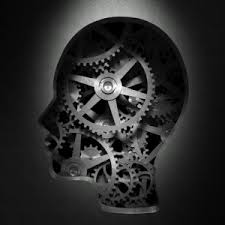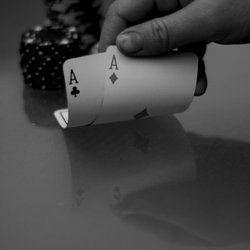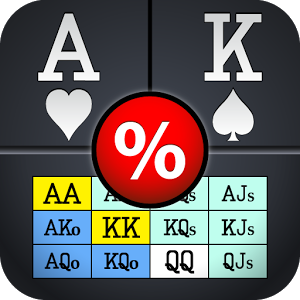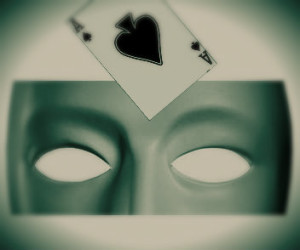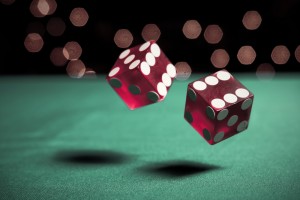I’m running badly at the moment. Well, hopefully by the time you read this I won’t be, but at time of writing I am definitely courting the dark side of variance. However, I did make a pretty good play earlier today that saved me two big bets.
The game was five-handed and the player under the gun raised. I re-raised with AK from the button and the blinds folded. I hadn’t played too much with the UTG player, but he seemed to be a reasonable player and hadn’t made any obviously bad plays in the time I had been there. The flop was AJ5 with two clubs. He checked and called my bet. He check-called again on the turn, which was and off-suit 6. The river was the J of diamonds, he checked and I checked behind. He showed QJ and took the pot with his trips. Had I bet, I would have been forced to make a crying call of his check-raise and lost two extra bets.
The reason I checked behind deserves some scrutiny. After the turn, I felt that his most likely hands were Jack or a flush draw. If he had a busted flush draw (or a gutshot) it didn’t really matter what I did because he would fold to my bet anyway. I felt that he would likely have raised an ace at some point to see where he stood. As he raised from the hijack seat it was unlikely he held a 5 (other than A5). Hence there were very few hands that I beat that he would call with so it was better to check behind.
At least that is the kind of thing I should have been thinking. However, if I’m honest, what I was actually thinking was something along the lines of ‘damn it, I bet he’s got the Jack, that would be pretty typical of how today’s session has gone, I should check behind just in case’. But once I made the check and it turned out to be the ‘right’ play, my mind was already filling in all the above details about busted draws, equity when called and the type of player he was etc.
In short, I was rationalizing
Rationalizing is a backwards way of making decisions. Ideally when we make any decision we will look at our options, evaluate these options based on the available data, our past experiences and our theoretical knowledge and then determine which option is best and execute it. If we are rationalizing then this process works more or less in reverse. We will decide which decision we want to make, then invent or selectively apply data, experiences and knowledge to justify it. Hence in retrospect it looks like we made a rational decision (and we can explain it that way to others) but in reality we fudged the entire process.
It is something that we all do from time to time, not just at the poker table but in everyday life as well. Everybody likes to think that they are a rational decision maker. However, everybody also has impulses to make decisions for reasons that are not necessarily rational. To equate the two we rationalize.
There are many real-life examples I could give. One very common one, that I’m sure most of you will identify with, is in the field of courtship. You are out somewhere (a bar, club, party or wherever) and spot a member of the opposite sex that you are interested in. You must decide if and how to approach them. If you approached the problem logically you would probably conclude that you have nothing to lose and that the potential gain far outweighs any possible affront to your ego if you are rejected. However, instinctively we are scared of rejection and so we chicken out. We will rationalize any number of excuses to justify this decision.
‘She didn’t look interested’
‘My drink was empty, I needed to go to the bar first’
‘That guy she spoke to earlier was probably her boyfriend’
‘She wasn’t as attractive as I first thought’
‘’I’ll go and speak to her later’
As bad as it may seem to still not have a date for Saturday night, the consequences are obviously a lot more serious if you start rationalizing more important decisions. For example, in my last year of college I got bored filling in long application forms to apply for jobs and decided to wait until after I graduated to find a job. I rationalized this by saying that it would give me a chance to concentrate on my degree. As a result I missed out on a lot of opportunities and it took me a while to find a good job after graduation.
At the poker table your decisions are what determines your long-term fate. If you consistently make bad decisions then you will be unable to win money, so you had better make sure that you are applying proper methodology to making these decisions. Because emotions often run high at the poker table, you can be itching to make a certain play for various reasons. For example, you want to call pre-flop with a hand you know you should fold, or call on the river with a hand you should raise. If you are not careful, you can find yourself on tilt, making decisions that you want to make and then rationalizing them later.
This is exactly what happened in the hand example at the start of the article. My rationalized argument for checking the river was reasonable, maybe even convincing, but it was still a sham. I didn’t give the option of value betting the river serious consideration, I just made a tilt-induced decision to check. That’s not to say that the decision was necessarily wrong (you could argue it both ways), but that’s hardly the point. When you are not basing your decisions on long-term expectation, then you are going to make some pretty significant mistakes. I like to think that I don’t do this very often, and only when the decision is close anyway, but it’s still a leak. And you can bet that if I find myself doing it after years of thinking and writing about emotional control, lots of players out there are rationalizing and doing it often.
This is one of the reasons that I am sceptical about players that claim to play through instinct rather than math and logic. Firstly, by playing through instinct you are leaving yourself very open to rationalizing. If you are not analysing every decision through sound principles, then you have nothing to fall back on when you are on tilt and your emotions are leading you to making unsound decisions. Secondly instinct is, in itself, a rationalization. If you make a decision that turns out to be correct (for example calling what turns out to be a bluff) then it is very easy to credit your instincts with that decision. It is possible to lie even to yourself that you made a decision through amazing poker instincts and not because you made a fudged decision and basically got lucky. However, when you make a bad decision, you will instead create some other rationalization that doesn’t compromise the reliability of your poker instinct.
Unfortunately we are good at rationalizing. It is something we have had years of practice at and it’s not an easy habit to break. If you are at the poker table and you find yourself badly wanting to make a decision for impulsive reasons, then that is a sign that you could be on tilt and would be better off quitting the game. It is difficult to spot where you go over the line from being fully in control of your decisions to when you perceive that you are making sound decisions, but are actually rationalizing. If you suspect that you might be then slow your game down a little. Take the time to think through every decision and ensure that your reasoning is sound before you actually make the decision. If you don’t have the patience or concentration to do this, then maybe it would be better to leave and come back when you do.
I hope this article has highlighted one of the hidden dangers you face when playing poker. Rationalizing is just one more way in which you can be your worst poker enemy at the table. Learning to spot and combat it is a great way to fix a leak and improve your game.
Submit your review | |

